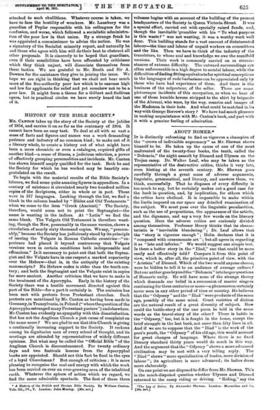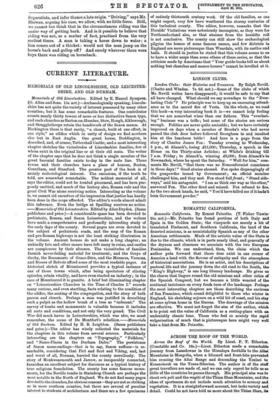ABOUT HOMER.* IT is distinctly refreshing to find so vigorous
a champion of the " crown of indivisible supremacy" as Mr. Shewan shows himself to be. He takes up the cause of one of the most maltreated of the twenty-four books, the tenth, called the " Doloneia," the night assault by Diomed and Ulysses on the Trojan camp. Dr. Walter Leaf, who may be taken as the representative of the destructive critics, thinks it very late, even hinting at the seventh century. Mr. Shewan goes carefully through a great mass of adverse arguments, linguistic, grammatical, and literary, and answers them, we think, successfully. That he disposes of every difficulty is too much to say, but he certainly makes out a good case for the book in question, and, by implication, for others which the critics have obelized. It is impossible to make within the limits imposed on our space any detailed examination of the subject. We must pass over the linguistic peculiarities, such as the use of prepositions, the appearance of the article, and the digamma, and say a very few words on the literary question. Here the adverse critics are curiously divided among themselves. Professor Henry thinks that its charac- teristic is " inevitable blundering " ; Dr. Leaf allows that the "story is vigorous enough " ; Holm declares that it is "composed with consummate art"; but all agree in regarding it as .• late and inferior." We would suggest one simple test. Is there a better story in the "Iliad," one that could be more easily and effectively told P Compare it from this point of view, which is, after all, the primitive point of view, with the " Aristeia" of Diomed. Which of the two would anyone choose, were he bidden to tell it to an audience of average culture ? But our author goes beyond the " Doloneia" into larger questions of Homeric unity. He will have none of the strange theory which demands our belief in a succession of master singers continuing for three centuries or more—a phenomenon certainly never seen in any other period of time or country. He believes that the " Odyssey " and the " Iliad " were products of the same age, possibly of the same mind. Great varieties of diction are the natural result of a great diversity of subject. How could the battle-story of the one poem be told in the same words as the travel-story of the other ? There is battle in the " Odyssey," too, but it is fought in the home, except the brief struggle in the last book, not more than fifty lines in all. And if we are to suppose that the " Iliad" is the work of the poet's youth, the " Odyssey" of his old age, this would account for great changes of language. Where there is no fixed literary standard thirty years would do much in this way. And the argument that the " Odyssey " shows a more advanced civilisation may be met with a very telling reply. The " Iliad " shows " more specialisation of trades, more division of labour "; its agriculture is more advanced; its ladies dress more elaborately.
On one point we are disposed to differ from Mr. Shewan. This is the much-disputed question whether Ulysses and Diomed returned to the camp riding or driving. " Riding," say the
'The Las of Dolon. By Alexander nelson. London : Macmillan and Co. [10a. net.]
Separatists, and infer thence a late origin. "Driving," says Mr. Shewan, arguing his case, we allow, with no little force. Still, we cannot but think that in the circumstances riding was the easier way of getting back. And is it possible to believe that riding was not, as a matter of fact, practised from the very earliest times. A man is taking a horse down to water: a lion comes out of a thicket : would not the man jump on the horse's back and gallop off ? And surely wherever there were boys there was riding on horseback.



























































 Previous page
Previous page